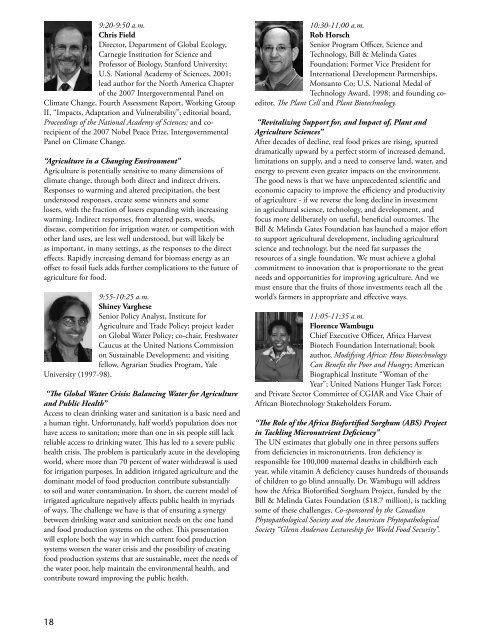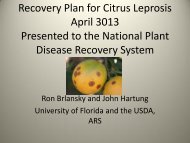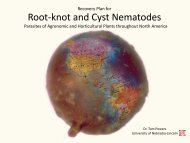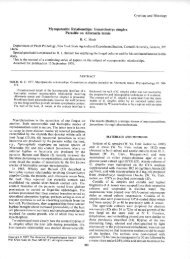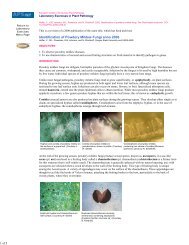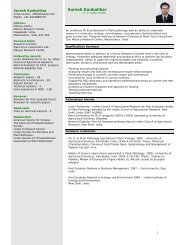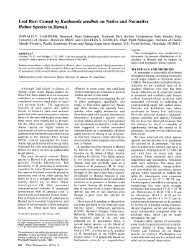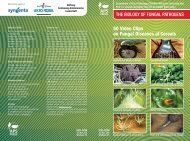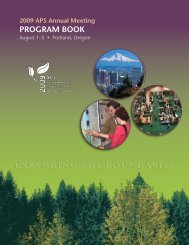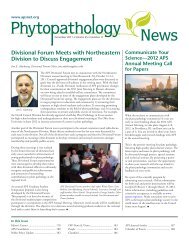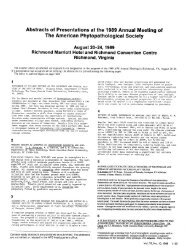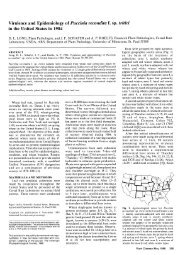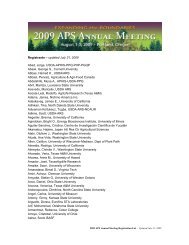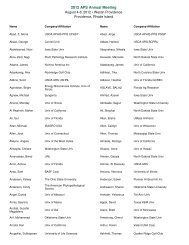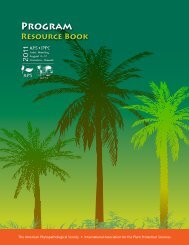See the program book (PDF) - American Phytopathological Society
See the program book (PDF) - American Phytopathological Society
See the program book (PDF) - American Phytopathological Society
Create successful ePaper yourself
Turn your PDF publications into a flip-book with our unique Google optimized e-Paper software.
9:20-9:50 a.m.<br />
Chris Field<br />
Director, Department of Global Ecology,<br />
Carnegie Institution for Science and<br />
Professor of Biology, Stanford University;<br />
U.S. National Academy of Sciences, 2001;<br />
lead author for <strong>the</strong> North America Chapter<br />
of <strong>the</strong> 2007 Intergovernmental Panel on<br />
Climate Change, Fourth Assessment Report, Working Group<br />
II, “Impacts, Adaptation and Vulnerability”; editorial board,<br />
Proceedings of <strong>the</strong> National Academy of Sciences; and corecipient<br />
of <strong>the</strong> 2007 Nobel Peace Prize, Intergovernmental<br />
Panel on Climate Change.<br />
“Agriculture in a Changing Environment”<br />
Agriculture is potentially sensitive to many dimensions of<br />
climate change, through both direct and indirect drivers.<br />
Responses to warming and altered precipitation, <strong>the</strong> best<br />
understood responses, create some winners and some<br />
losers, with <strong>the</strong> fraction of losers expanding with increasing<br />
warming. Indirect responses, from altered pests, weeds,<br />
disease, competition for irrigation water, or competition with<br />
o<strong>the</strong>r land uses, are less well understood, but will likely be<br />
as important, in many settings, as <strong>the</strong> responses to <strong>the</strong> direct<br />
effects. Rapidly increasing demand for biomass energy as an<br />
offset to fossil fuels adds fur<strong>the</strong>r complications to <strong>the</strong> future of<br />
agriculture for food.<br />
9:55-10:25 a.m.<br />
Shiney Varghese<br />
Senior Policy Analyst, Institute for<br />
Agriculture and Trade Policy; project leader<br />
on Global Water Policy; co-chair, Freshwater<br />
Caucus at <strong>the</strong> United Nations Commission<br />
on Sustainable Development; and visiting<br />
fellow, Agrarian Studies Program, Yale<br />
University (1997-98).<br />
“The Global Water Crisis: Balancing Water for Agriculture<br />
and Public Health”<br />
Access to clean drinking water and sanitation is a basic need and<br />
a human right. Unfortunately, half world’s population does not<br />
have access to sanitation; more than one in six people still lack<br />
reliable access to drinking water. This has led to a severe public<br />
health crisis. The problem is particularly acute in <strong>the</strong> developing<br />
world, where more than 70 percent of water withdrawal is used<br />
for irrigation purposes. In addition irrigated agriculture and <strong>the</strong><br />
dominant model of food production contribute substantially<br />
to soil and water contamination. In short, <strong>the</strong> current model of<br />
irrigated agriculture negatively affects public health in myriads<br />
of ways. The challenge we have is that of ensuring a synergy<br />
between drinking water and sanitation needs on <strong>the</strong> one hand<br />
and food production systems on <strong>the</strong> o<strong>the</strong>r. This presentation<br />
will explore both <strong>the</strong> way in which current food production<br />
systems worsen <strong>the</strong> water crisis and <strong>the</strong> possibility of creating<br />
food production systems that are sustainable, meet <strong>the</strong> needs of<br />
<strong>the</strong> water poor, help maintain <strong>the</strong> environmental health, and<br />
contribute toward improving <strong>the</strong> public health.<br />
18<br />
10:30-11:00 a.m.<br />
Rob Horsch<br />
Senior Program Officer, Science and<br />
Technology, Bill & Melinda Gates<br />
Foundation; Former Vice President for<br />
International Development Partnerships,<br />
Monsanto Co; U.S. National Medal of<br />
Technology Award, 1998; and founding coeditor,<br />
The Plant Cell and Plant Biotechnology.<br />
“Revitalizing Support for, and Impact of, Plant and<br />
Agriculture Sciences”<br />
After decades of decline, real food prices are rising, spurred<br />
dramatically upward by a perfect storm of increased demand,<br />
limitations on supply, and a need to conserve land, water, and<br />
energy to prevent even greater impacts on <strong>the</strong> environment.<br />
The good news is that we have unprecedented scientific and<br />
economic capacity to improve <strong>the</strong> efficiency and productivity<br />
of agriculture - if we reverse <strong>the</strong> long decline in investment<br />
in agricultural science, technology, and development, and<br />
focus more deliberately on useful, beneficial outcomes. The<br />
Bill & Melinda Gates Foundation has launched a major effort<br />
to support agricultural development, including agricultural<br />
science and technology, but <strong>the</strong> need far surpasses <strong>the</strong><br />
resources of a single foundation. We must achieve a global<br />
commitment to innovation that is proportionate to <strong>the</strong> great<br />
needs and opportunities for improving agriculture. And we<br />
must ensure that <strong>the</strong> fruits of those investments reach all <strong>the</strong><br />
world’s farmers in appropriate and effective ways.<br />
11:05-11:35 a.m.<br />
Florence Wambugu<br />
Chief Executive Officer, Africa Harvest<br />
Biotech Foundation International; <strong>book</strong><br />
author, Modifying Africa: How Biotechnology<br />
Can Benefit <strong>the</strong> Poor and Hungry; <strong>American</strong><br />
Biographical Institute “Woman of <strong>the</strong><br />
Year”; United Nations Hunger Task Force;<br />
and Private Sector Committee of CGIAR and Vice Chair of<br />
African Biotechnology Stakeholders Forum.<br />
“The Role of <strong>the</strong> Africa Biofortified Sorghum (ABS) Project<br />
in Tackling Micronutrient Deficiency”<br />
The UN estimates that globally one in three persons suffers<br />
from deficiencies in micronutrients. Iron deficiency is<br />
responsible for 100,000 maternal deaths in childbirth each<br />
year, while vitamin A deficiency causes hundreds of thousands<br />
of children to go blind annually. Dr. Wambugu will address<br />
how <strong>the</strong> Africa Biofortified Sorghum Project, funded by <strong>the</strong><br />
Bill & Melinda Gates Foundation ($18.7 million), is tackling<br />
some of <strong>the</strong>se challenges. Co-sponsored by <strong>the</strong> Canadian<br />
<strong>Phytopathological</strong> <strong>Society</strong> and <strong>the</strong> <strong>American</strong> <strong>Phytopathological</strong><br />
<strong>Society</strong> “Glenn Anderson Lectureship for World Food Security”.


